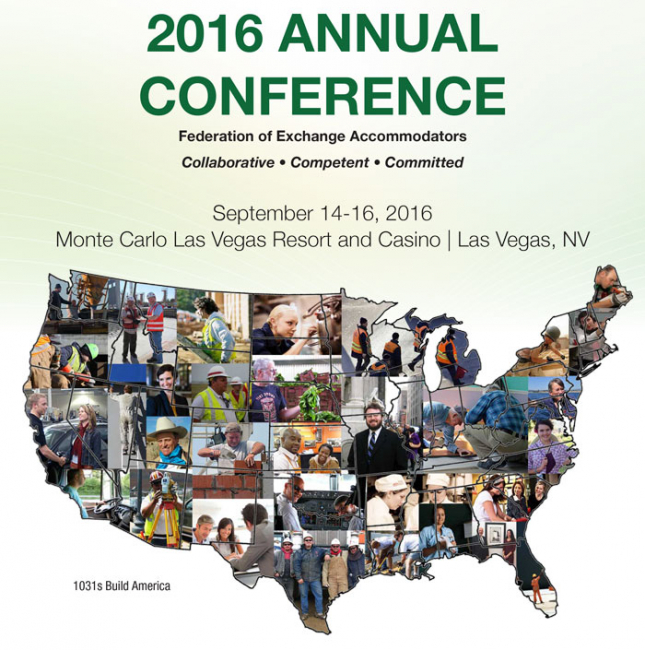BLOG
Federation of Exchange Accommodators – The Road Ahead

Last month the Federation of Exchange Same as intermediary, facilitator, or Qualified Intermediary. The party who facilitates a tax-deferred exchange by acquiring and selling property in an exchange to aid the taxpayer in complying with Section 1031 and all applicable rules. Accommodator s (FEA) held its annual conference in Las Vegas. The FEA is the national organization that represents professionals engaged in the practice of facilitating like-kind exchanges, known as qualified intermediaries (QIs). The FEA also counts as members, professionals not acting as QIs, but providing important services related to Section 1031 transactions. This year, economic expansion has resulted in higher attendance numbers, translating into one of the biggest conferences in recent memory.
This year’s meeting provided a forum for electing officers, conducting critical strategic planning sessions, and for leading highly informative educational sessions.
Election of Officers
This year, Accruit’s own Steve Chacon, Vice President of Exchange Service Operations was elected as the association’s president. Also elected were:
- Teresa Person, President-Elect
- Mike Anderson, Treasurer
Margo McDonnell will continue to serve as the association’s Immediate Past President.
Strategic Planning
Prior to the conference’s kickoff, the association’s Board of Directors met to focus upon legislative issues. The FEA Board of Directors also met for a wider strategic planning session to ensure the organization continues to effectively serve its membership through an updated plan to guide the organization into the future.
A Focus on Legislative Issues – Threats to Section 1031
The FEA’s Government Affairs Committee, Co-Chaired by Accruit CEO, Brent Abrahm, assembled an agenda to identify and guide the board through legislative challenges that lie ahead, including:
- The House Republican Blueprint for Tax Reform
- Senator Ron Wyden’s proposal for depreciation pooling
- The President’s proposed 2017 budget
- Overall tax reform plans
Threats also lie within proposals to limit like-kind exchanges from Secretary Clinton and Nominee Trump. Trump’s campaign has expressed interest in eliminating corporate tax expenditures which could directly impact Section 1031 and the role of the QI.
A Focus on a Wider Strategy
Leveraging feedback from the association’s membership, the board conducted a strategic planning session that included the following targeted outcomes:
- Identifying mission and core values
- Confirming the vision statement
- Confirming key goal areas
- Listing actions, responsibilities and time frames
The process for achieving the targeted outcomes included:
- Reviewing targeted outcomes for the session and the strategic planning model
- Identifying member characteristics and statistics
- Sharing survey results
- Setting goal performance measures
The FEA’s Board of Directors is currently reviewing, refining and finalizing the FEA’s wider strategic plan. The final plan will incorporate the results of the legislative strategic planning session and provide a comprehensive roadmap for the preservation and expansion of the association.
Educational Sessions
This year’s educational lineup included a host of technical experts conducting sessions with topics such as:
- A View from the Hill – Accruit CEO, Brent Abrahm, joined by the FEA’s D.C. lobbyist and members of the Government Affairs Committee, gave an overview of the prospects for tax reform after the presidential election.
- Protecting Against Cyber Fraud – Discussion on current cyber fraud/cyber-crime activities targeting banks and their clients and what companies can do to protect themselves
- Foreign Investor: What You Need to Know for 1031 and FIRPTA Purposes – Discussion on how transactions subject to FIRPTA are complex and can potentially expose a QI to withholding obligations
- State Issues Affecting Internal Revenue Code Section 1031 states that "no gain or loss shall be recognized on the exchange of property held for productive use in a trade or business or for investment if such property is exchanged solely for property of like kind which is to be held for productive use in a trade or business or for investment." 1031 Exchange s – Discussion on state-specific considerations for IRC Section 1031 transactions
- Exchanges of Agricultural Property & Equipment, Conservations Easement is the right to use the real property of another for a specific purpose. The easement is itself a real property interest, but legal title to the underlying land is retained by the original owner for all other purposes. Typical easements are for access to another property, for utility or sewer lines both under and above ground, use of spring water, entry to make repairs on a fence or slide area, drive cattle across and other uses. Easements can be created by a deed to be recorded just like any real property interest. Easement s, Water Rights and Other Assets – A discussion on agricultural exchanges, including their importance and how they are a catalyst for economic activity
The Road Ahead
Like-kind exchanges have been a hot topic amongst our federal lawmakers. With recent focus on federal deficits, budgets, tax reform and Presidential Nominee Trump’s tax returns, like-kind exchanges represent a significant revenue-raising opportunity. The FEA’s conference provided an important forum for those in the like-kind exchange industry to come together to refine and expand efforts to preserve and expand Section 1031.
